E-BOOK
Harnessing the Power of Social Annotation at Higher Education Institutions
In the evolving landscape of higher education, where technology and innovative teaching methodologies converge, the traditional act of reading is being transformed. Amidst this transformation, social annotation emerges as an impactful tool, turning solitary reading assignments into dynamic, collaborative experiences. At the heart of this evolution is Hypothesis, the leading social annotation tool that facilitates interactive learning by allowing students and educators to engage directly with any piece of online content.
This e-book delves into the transformative power of social annotation, spotlighting its significant impact on teaching and learning in higher education. Through a compilation of insightful case studies and expert perspectives, we uncover the multifaceted benefits of integrating Hypothesis into the classroom. From creating inclusive learning environments to enhancing student engagement, promoting reading completion, and improving student outcomes, these stories provide compelling evidence of social annotation’s role in enriching the educational experience.
Table of Contents:
What is Social Annotation?
Social annotation is similar to the margin notes once made in physical textbooks but with a digital twist. It transforms reading from a solitary task into a dynamic group discussion, right on the pages of digital content like web pages, PDFs, and videos. Instead of silently reading and perhaps jotting down private notes, users can highlight text, pose questions, share insights, and engage in discussions directly on the material. This method brings the age-old practice of scribbling in book margins into the digital age, enhancing it with the power of real-time collaboration.
Why Social Annotation is Important:
Enhances Collaborative Learning:
Social annotation turns reading into a team activity, allowing students and educators to work together to explore texts. This collaboration can lead to richer educational experiences as students learn from each other’s insights and perspectives.
Facilitates Interactive Engagement:
By enabling users to interact directly with the text through comments and questions, social annotation ensures that students are not just passive recipients of information but active participants in their learning process.
Encourages Meaningful Discussions:
The tool fosters a dialogic form of learning where students and teachers can engage in meaningful discussions. This dialogue helps deepen understanding as the text becomes a central pivot point for debate and clarification.
Builds Community Among Learners:
Social annotation helps create a sense of community among students. As they see and respond to each other’s thoughts and questions, a virtual learning community develops, promoting a sense of belonging and mutual support.

“I honestly feel like… social annotation has been the closest thing to a magic bullet that I’ve ever encountered in teaching; the change in student behavior has been very dramatic and deepened the course experience.”
— Dr. Emily Ragan
Associate Professor, Department of Chemistry and Biochemistry, Metropolitan State University of Denver
The Impact of Social Annotation with Hypothesis
Over many years, Hypothesis has emerged as the leading tool in social annotation, partnering with institutions to refine strategies and best practices for enhancing student engagement and comprehension in their courses. Through these partnerships, Hypothesis has demonstrated significant impacts on student learning outcomes and institutional teaching methods. This guide will delve into these impacts, drawing on real-world case studies to illustrate the transformative power of social annotation in educational settings.
Impact 1: Creating Inclusive Learning Environments
At Contra Costa Community College District (4CD), Hypothesis has been transformative in creating inclusive learning environments for a diverse student body. Instructional Technologist Kat King emphasized, “Our faculty wanted tools to help all students feel welcomed and supported in the classroom. This is critical to the equity work so fundamental to our college.”
Contra Costa Community College District
Bay Area, California
Public, 2-year district with 45,000 students across 5 campuses
Diverse student population:
Hypothesis quickly facilitated a more inclusive learning environment among students who arrived with varied levels of academic preparation and faced unique challenges, including learning disabilities. Social annotation allowed all students, no matter their learning style, to feel comfortable sharing their thoughts and viewpoints on the course materials.

“With Hypothesis, there are no right or wrong answers. I can empower students to challenge ideas and express their own point of view.”
— Brandon Marshall
English Professor at 4CD’s Contra Costa College.
The success at 4CD is a testament to the power of social annotation in breaking down barriers to learning. With 366,311 annotations made, the impact is clear: 72% of students reported that Hypothesis helped them think more critically about their readings, highlighting the tool’s role in fostering a more inclusive and engaging educational experience. “Because students actually enjoy using Hypothesis, our faculty has bought in, so much so that they’ve begun convincing their colleagues at other colleges to implement it,” notes Kat King.
Impact 2: Promoting Reading Completion and Engagement with Texts
The integration of Hypothesis with Bookshelf® by VitalSource at the University of Texas at Austin (UT Austin) and the University of Minnesota Twin Cities has significantly increased students’ engagement with reading assignments.
At UT Austin, Assistant Professor Viranga Perera noted a remarkable increase in eText interactions from an average of 7 times per semester to 36 after implementing Hypothesis. He attributed this to making annotations a graded component, stating, “Making annotations even a small percentage of the grade is enough to get students to pay attention and do the readings.” This approach not only spurred completion of readings but also enhanced lecture and discussion preparedness.
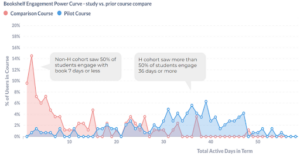
Professor Allison Brenneise at the University of Minnesota used Hypothesis to encourage active engagement, turning reading into an interactive process. Post-implementation, student interactions with eTexts more than doubled.

“With Hypothesis, students learn how powerful it is for their peers to read their work and give feedback. They become more invested in what they’re doing.”
— Professor Allison Brenneise
University of Minnesota
At Moravian University, Associate Professor of English Crystal Fodrey employed Hypothesis to boost engagement in their summer reading program. Previously, incoming freshmen were largely skipping summer readings, arriving unprepared for fall. By mandating annotations on selected texts, over 500 freshmen created around 6,000 annotations, significantly improving their readiness for the semester.
Together, these impact stories from UT Austin, the University of Minnesota, and Moravian University illustrate the broad spectrum of benefits associated with social annotation tools like Hypothesis. By making reading an interactive, communal activity, Hypothesis promotes not only the completion of assigned texts but also enhances students’ comprehension and engagement, laying a solid foundation for academic success.
Impact 3: Increasing Retention and Grades in Courses
Integrating Hypothesis at CUNY Kingsborough Community College and Cerritos Community College has significantly transformed student engagement, comprehension, academic performance, and retention across diverse educational settings, highlighting the tool’s broad applicability and effectiveness in education.
At Kingsborough Community College, under Professor Kristin Polizzotto’s guidance, the challenges of engaging students in a hybrid learning environment were addressed by implementing Hypothesis. This led to a notable increase in student engagement and a significant rise in A+ grades. Polizzotto observed, “Typically, I’d spot one or maybe two A+’s, but this term saw nearly half the class achieving this level of excellence.” This demonstrated the strong connection between Hypothesis use and improved academic performance, also fostering a cohesive learning community that enhanced students’ sense of belonging and academic curiosity.
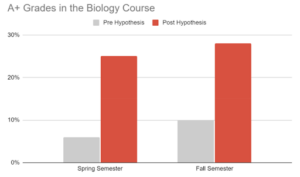
At Cerritos College, Professor Francie Quaas-Berryman’s use of Hypothesis in English and drama courses also yielded extraordinary results, with courses achieving a 100% success rate and a dramatic decrease in dropouts—from seven to just one in drama classes.

“It was insane to me, the difference. I had never had a class with a 100% success rate.”
— Professor Francie Quaas-Berryman
Cerritos College
This underscores Hypothesis’s role in not only engaging students with course content but also significantly boosting their academic outcomes and commitment to their studies.
These successes at CUNY Kingsborough and Cerritos Community College demonstrate how strategic use of social annotation can revolutionize educational experiences by deepening text engagement, encouraging active participation, and fostering community, proving Hypothesis to be an invaluable tool in enhancing learning in both remote and face-to-face settings.
Impact 4: Improving Comprehension of Scholarly Material
The College of Pharmacy at an R1 institution in the Midwest, led by Senior Lecturer Nicholas Denton, has demonstrated the transformative effect of Hypothesis on student engagement and understanding of scientific research texts. Hypothesis was implemented in pharmacy, psychology, and cancer underclassmen courses, significantly enhancing students’ interactions with scholarly research and boosting comprehension of course materials.
Key outcomes after implementing Hypothesis illustrate the profound impact:
Doubling Comprehension:
There was a twofold increase in undergraduate students achieving a graduate-level understanding of their subjects. This improvement went beyond just deciphering complex jargon; students also offered deeper explanations and used external resources to enhance their understanding.
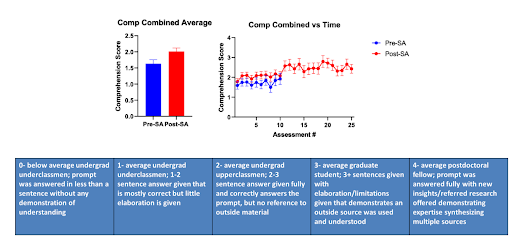
Near-Universal Engagement:
Faculty noted nearly 100% student engagement, a significant increase from previous levels. This surge in involvement was credited to Hypothesis’s ability to make scientific texts more accessible and to create an inclusive environment that encouraged exploration and inquiry.
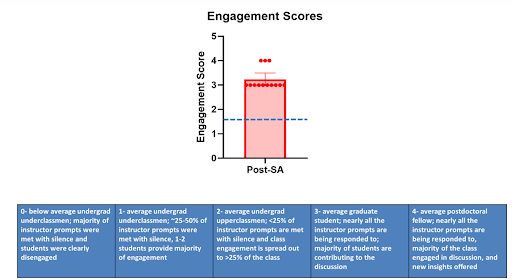
Enhancing Persistence in Science Fields:
The tool also made notable improvements in self-efficacy and science identity, especially among BIPOC and first-generation students. These are crucial factors for persistence in STEM fields, suggesting that Hypothesis not only boosts immediate academic performance but also contributes to long-term academic and professional success.
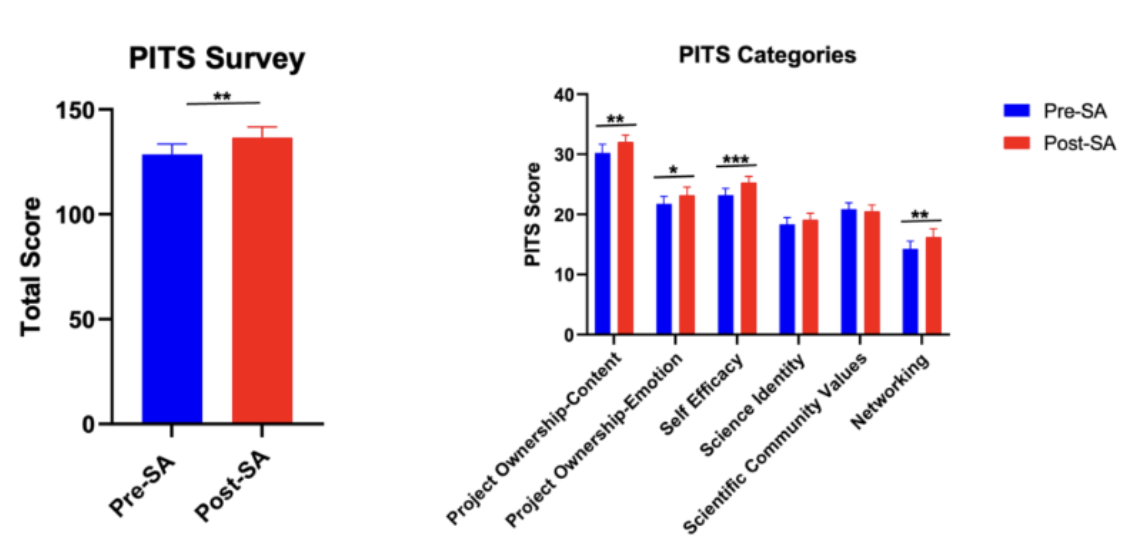
Denton’s reflection on the inclusive nature of Hypothesis underscores its role in leveling the playing field for students traditionally marginalized in scientific discourse. By enabling a platform where every student could contribute and engage without fear of reprisal, Hypothesis facilitated a learning environment where diversity of thought and background enriched the academic experience for all involved. Leading to increased comprehension of the course material.

“We saw a level of comprehension in our undergraduate students on par with what we’d expect from graduate students.”
— Nicholas Denton
Senior Lecturer of Pharmacy Education and Innovation
Impact 5: Increasing Student Engagement
Indiana University Bloomington’s implementation of Hypothesis in its first-year composition writing seminars significantly enhanced student engagement in online settings. Associate Professor Justin Hodgson noted the positive response from students: “Students loved Hypothesis.” This tool transformed reading from a solitary to a communal activity, deepening students’ engagement with texts and fostering vibrant discussions that connected digital and physical learning environments.
An IRB-approved study quantified this impact, recording nearly 79,000 annotations across three semesters. This level of engagement underscored Hypothesis’s effectiveness in drawing students into course materials and fostering an interactive learning environment, which proved especially valuable in overcoming the challenges of remote learning.
By the numbers
Data from Indiana University Bloomington’s IRB-approved study regarding Hypothesis usage over the Fall 2021, Spring 2022, and Fall 2022 semesters
Hodgson’s use of Hypothesis at Indiana University Bloomington highlights how social annotation tools can revolutionize online education by promoting deeper textual engagement and enhancing student interaction, making learning more engaging, interactive, and community-focused.

“Hypothesis is one of the single most impactful tools I’ve ever brought into a classroom. It’s such a low lift, and the yield is so high in terms of what I’m getting back as the instructor.”
— Justin Hodgson
Associate Professor of English, Indiana University Bloomington
Conclusion
As we conclude this exploration into the transformative impact of social annotation through Hypothesis in higher education, it becomes evident that this is more than just a tool for margin notes and commentary. It represents a shift in how educators and students interact with texts and each other, fostering a deeper engagement with learning materials and facilitating a more collaborative and inclusive educational environment.
Across diverse institutions and disciplines, the implementation of Hypothesis has led to remarkable outcomes. Moreover, the quantitative results highlighted throughout this e-book, such as the doubling of comprehension levels at a College of Pharmacy and the significant surge in grades at Kingsborough, underscore the tangible impact Hypothesis can have on academic performance. These achievements not only reflect the tool’s capacity to enrich the educational experience but also its potential to fundamentally improve educational outcomes.
Hypothesis stands at the forefront of educational innovation, offering a bridge between traditional pedagogies and the future of learning. By embedding collaboration, critical thinking, and community directly into the fabric of academic materials, Hypothesis is redefining what it means to read, learn, and succeed in the digital age. As educators and institutions look forward to shaping the future of higher education, social annotation with Hypothesis offers a proven pathway to a more engaged, inclusive, and successful academic journey for all students.